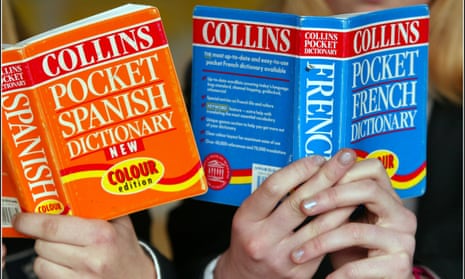What languages should we teach children in schools, and why? The question came to the fore on Monday after the Polish prime minister, Beata Szydło, called on Theresa May to introduce Polish classes in British schools.
With 831,000 Poles living in Britain – they make up the largest immigrant group in the UK – introducing the language certainly could help communities feel more integrated.
Traditionally in secondary schools in the UK, the most widely taught languages have been French, Spanish and German, according to data from the British Council in collected from 2013 to 2014. In 2010 the government also decided to train 1,000 Mandarin teachers to work in secondary schools in England thanks to China’s increasing influence on the global economy.
How should we select languages for the curriculum? Should we choose those that are spoken the most in Britain? What languages have been most helpful to you? We asked our readers these questions and this is what they said.
Tom Sneddon, Northern Ireland: It’s not just about the language but giving people an enjoyable experience
It is impossible to predict what languages a child will need as an adult. The range of plausible possibilities is too vast.
As such, it’s vital that we give children the tools to learn a language – rather than focusing on what language that should be. As a citizen of Northern Ireland, I’m a big supporter of primary schools teaching through the medium of Irish. Not just because it’s culturally important, but because it provides vital language-learning skills. Speakers of two languages are not as daunted by a third language as monoglots are by a second.

Given the huge range of languages available, I’d plump for the not-immediately-obvious choices of either Dutch or Italian. Both are (I think) fun to speak and easy to learn. It’s not about the language itself, but giving young people an enjoyable experience. This means they will want to continue language studies.
For me personally, German has proved most useful, though that’s in the narrow sphere of its actual application. In a broader sphere of what could be called “personal development” the most valuable language for me has been Hungarian. Learning Hungarian involved learning to see the world through new eyes grammatically speaking. It has a dozen grammatical cases, and a host of entirely unfamiliar conceptualisations of the world. The experience was fantastically interesting, and gave me the confidence to feel that I could learn any language.
Amir Mohammed, 19 from Canada: Knowing your national language helps you explore your identity
As someone outside the UK, I can offer a different perspective. These are some of the reasons certain languages are more present in schools. They tend to be selected because of things like their cultural value or how easy they are to learn. But I think any of the United Nations languages, as well as German, Portuguese and Japanese are all useful.
We live in a global society, after all. A lot of foreign languages will be useful for future employment. I can also vouch for German and Arabic as being rich, interesting and beautiful languages. They are of great cultural value.
I agree with the fact Wales makes Welsh compulsory. Knowing the national language of your people helps you explore your own identity and gives you more confidence in who you are.
I am still a typical British monoglot, unfortunately. But I hope to become fluent in at least two or three languages when I am older. I am of Pakistani descent and have visited my homeland many times, but my father never spoke to me in Urdu, so I never learned it. But, because all the Pakistani side of my family knows English, me and my siblings never bother to learn it. When I was younger, I held this silly little view that there was no point in learning languages because “everyone speaks English”. Now I feel left out when I see my cousins, my father, and my uncles and aunts chatter away in their native tongue and realise what a fool I’ve been. If I could go back in time and tell my younger self one thing it would be to put some effort into learning Urdu. It is not as spoken as English, but on a personal level I do, and would, value it.
Anonymous student, 17, from Kent: The languages should reflect our multicultural communities
French and Spanish are important as they are spoken in many countries. But I think there also needs to be an introduction of languages that are widely spoken in England, such as Polish, Chinese dialects and Hindi. This would be good considering our multicultural communities.

The best languages I learned were French and Hindu. French helped me learn Spanish, the two are so similar. French is a complicated, so learning it has helped me understand other dialects.
I believe that we start learning languages far too late in the UK. The Spanish I was taught in school was shaved down to colours and animals. We need to put more stress on languages in primary school. I also know Hindi, the national language of India. I can use this in my travels. Languages in my opinion are the most difficult, but most effective, way of understanding a foreign culture.
Language lessons at GCSE are rubbish to be honest. There’s no emphasis on pronunciation or spoken conversations, which is the primary method of getting around in another country. No teacher has ever corrected me with my pronunciation, it’s a combination of TV and film that has helped me improve.
Katherine, 27 from Surrey: I would love to see the return of classical languages as they help us understand grammar
I would advocate any modern languages, but those linked to English (such as German) seem like the obvious choices. Many other languages pose a complexity to English-speakers that may put students off languages for good.
What I would love to see is a return to teaching classical languages – they make a brilliant back-up to modern foreign language teaching. They are great because they reinforce grammar and vocabulary learning.

I was fortunate enough to do A-levels in German and ancient Greek, as well as AS-level French. I love German-speaking countries and their cultures. I have spent my Erasmus year in Bavaria, and am now doing a PhD in a field related to German studies. Learning German has shaped much of my adult life.
My German would not be half of what it is today had I not learned Latin and ancient Greek. Grammar is all the vogue in English teaching, but there’s nothing like classics to impart an understanding. I cannot emphasise enough the value of these languages to my education.
Ruby, 22, from London: We should teach a broader range of languages to young people
Arabic should be taught at a GCSE level to all students, as an optional language, much like French, German, Spanish etc are provided. We have a very large Arabic population in Britain, particularly in West London. This is particularly true in the sixth form where I work.
It would be fantastic to see that culture integrated into our education system, as so many of our students speak Arabic at home yet are not encouraged to learn it at school.
I found that learning Spanish for seven years during school beneficial, especially in my personal life. However, I would love to see more modern languages introduced. Many schools do not encourage the learning of languages past year 8, which I also feel is a great shame.
Luke, 17, from Glasgow: Languages should be taught depending on how helpful they will be for employment
The languages that should be taught should be based on where jobs and industry are. This gives people the opportunity to move to a different country for their career. German is useful, for example, as there is a large economy in the automotive industry there. Mandarin is another good language because of China’s booming trade and industry. Languages should also be of interest to students learning them. I despised French in all the years that I have been learning it, yet it was forced upon me. I had to take it at school as it was one of the only options. In some schools languages are enforced for the majority of students yet we are not given the option of what language is compulsory.
My parents immigrated from Hong Kong to Scotland roughly 23 years ago. I grew up speaking both English and Cantonese. Cantonese has been useful when travelling to Hong Kong visiting family. I also went on an German Exchange trip where my German skill came into use which was helpful when communicating with others.
What do you think and why? Share your views in the comments.
